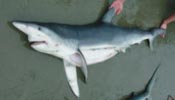Oceana highlights the destructive shark fishing activities of EU fleets

In a letter sent to the Western and Central Pacific Fisheries Commission, the marine conservation organisation advised that fishing access be prohibited for the EU vessels targeting sharks until shark fisheries management measures are introduced for these vulnerable species.
Oceana cautioned the delegates of the Western and Central Pacific Fisheries Commission (WCPFC) today that the majority of the 96 European Union vessels, recently authorized to fish in the western and central Pacific Ocean, target sharks - vulnerable species that are not managed in this area.
The WCPFC is the regional fisheries management organisation that manages fishing rights in the central and western Pacific Ocean. The WCPFC Technical and Compliance Committee, which proposes technical measures for the regulation of fisheries in WCPFC waters, will meet 27 September - 2 October in Micronesia.
The WCPFC is a relatively new RFMO, and as such presents an important opportunity to establish progressive and precautionary management measures for sharks captured in its area of regulation.
In fact, the WCPFC urges its members to implement Plans of Action for the Conservation and Management of Sharks by the start of 2008. However, the European Union neither implemented a Community Plan of Action for Sharks nor efficient shark fisheries management measures, eight years after the Food and Agriculture Organization of the United Nations (FAO) asked that shark fishing nations do so.
Oceana has recommended that the WCPFC prohibit access of these European Union shark-fishing vessels to their fishing grounds until the EU implements its Community Plan of Action for the management of shark fisheries, including measures to protect endangered shark species, manage commercialized stocks, reduce unwanted shark by-catch, eliminate shark discards and close any possible loopholes regarding the illegal practice of “finning”.
Xavier Pastor, Executive Director for Oceana Europe, explains: "European Union vessels search for new fishing grounds further and further in the world’s oceans because European waters are widely overfished. Due to unmanaged shark and ray fisheries in Europe, about one-third of the populations here are now considered Threatened with extinction by the World Conservation Union. We must prevent the same thing from happening in the Pacific."
The 96 vessels presented by the European Union to fish in WCPFC waters are involved in a number of fisheries that severely damage shark populations around the world. For example, according to ICCAT and other regional fisheries management organisations:
- The 39 Spanish and Portuguese surface longliners authorized to fish in the WCPFC area target blue and mako sharks. Indeed, pelagic shark fisheries have boomed in recent decades, and according to World Conservation Union (IUCN) Red List criteria, mako sharks are considered globally Threatened with extinction.
- Some of the 15 British and Portuguese-flagged deep-sea gillnetters authorized to fish in the WCPFC area have been responsible for bringing certain European deep-sea shark species near extinction, due to previously uncontrolled unmanaged fishing activities of this powerful fleet. In fact, the European deep-sea gillnet fishery was closed due to its wastefulness and the damage it caused to deep-sea shark species.
- The 33 French and Spanish tuna purse seiners that have applied for fishing rights in the WCPO take large amounts of sharks as by-catch. Nearly all thirteen shark species commonly caught as bycatch in the WCPFC tuna fisheries are considered Threatened according to the IUCN Red List.
Oceana has urged the members of the WCPFC Technical and Compliance Committee to prohibit fishing access for the European Union fishing vessels targeting sharks until shark stocks are assessed, fishing quotas and other technical measures introduced, and shark by-catch significantly reduced. Fishing access should also be prohibited for these EU vessels until the EU implements its Community Plan of Action to help reverse the declines suffered by sharks at the hands of EU fishing vessels all over the world.






